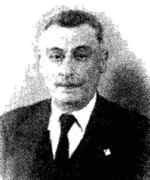Person: Padoa, Alessandro

Alessandro Padoa was an Italian mathematician and logician.
Mathematical Profile (Excerpt):
- He was greatly influenced by Peano who was to direct Padoa's research.
- Padoa was awarded a mathematics degree from the University of Turin on 26 November 1895 and he continued to study at Turin for his Diploma in Mathematical Education which was necessary for him to become a high school teacher.
- After graduating, Padoa became a secondary school teacher of mathematics following the advice of Enrico D'Ovidio, teaching first at the high school in Pinerolo as well as at the Technical Institute "Michele Buniva" in that city where he acted as a substitute for Carlo Vercesi.
- However, Padoa also gave many lecture courses at Naval Academy in Genoa including 'Algebraic Analysis' (1911-12 and 1913-14), 'Infinitesimal Calculus' (1912-13) and 'Further Mathematics' (1914-1930).
- (Before Padoa became a teacher at the High School "Cristoforo Colombo" in Genoa, Vitali had taught there from 1904 to 1923.) In 1932 Padoa was appointed as a lecturer in Mathematical Logic at the University of Genoa and he held this post until 1936 when he reached the age limit for lecturers and was forced to retire.
- This was certainly not the first time that Padoa had attempted to leave school teaching and become a university lecturer; he had applied unsuccessfully for a lectureship in Mathematical Logic in 1901, a lectureship in Descriptive Geometry in 1909, and a lectureship in Theoretical Philosophy in 1912.
- Padoa became a member of the examination committee for the Technical College in the Sampierdarena district of Genoa in 1914.
- Padoa also gave lectures at many philosophy and mathematics congresses.
- Padoa was the first to present a method to prove that a primitive term of a theory cannot be defined within the system using the remaining primitive terms.
- Padoa spoke on A new system of definitions for Euclidean geometry but began with a summary of his lecture at the Philosophy Congress.
- In March 1903 Padoa published a long deep article in L'Enseignement Mathématique on compatibility of axioms and non-contradictory axioms.
- Padoa published the 106-page book La Logique Déductive dans sa dernière Phase de Développement Ⓣ(Deductive logic in its final development phase) in 1912.
- M Padoa - previously my distinguished student and now my colleague and my friend - has given to this subject, since 1898, a series of well-attended conferences in the Universities of Brussels, Pavia, Rome, Padua, Cagliari and Geneva, and has presented highly regarded papers to the Congresses of philosophy and mathematics in Paris, Livorno, Parma, Padua and Bologna.
- Continuing his work as a collaborator and adviser, M Padoa has led everyone to appreciate the simplicity and power of the ideographic language - which has given birth to a new development in deductive logic and a further analysis of the different branches of mathematics - and to consult profitably and easily the many books in which it is applied.
- The aim of this work seems to me to present it in a way which is clear, orderly, and complete: it contains the explanation of all the logical symbols, the study of their properties, analysis of their relationships and their reduction to minimum, due to M Padoa.
- In 1937, after he retired, Padoa published the paper Ce que la Logique doit a Peano Ⓣ(What logic is necessary for Peano?).
- Padoa was also a well-respected contributor of papers on the teaching of elementary mathematics and on mathematical education.
- Padoa was invited by Guido Castelnuovo to participate in the International Commission on Mathematical Instruction founded at the International Congress of Mathematicians at Rome in 1908.
- In 1934 Padoa was awarded the mathematics prize of the Accademia dei Lincei and in the following year he was presented with a prize by the Royal Academy of Italy.
Born 14 October 1868, Venice, Italy. Died 25 November 1937, Genoa, Italy.
View full biography at MacTutor
Tags relevant for this person:
Origin Italy
Thank you to the contributors under CC BY-SA 4.0! 

- Github:
-

- non-Github:
- @J-J-O'Connor
- @E-F-Robertson
References
Adapted from other CC BY-SA 4.0 Sources:
- O’Connor, John J; Robertson, Edmund F: MacTutor History of Mathematics Archive
